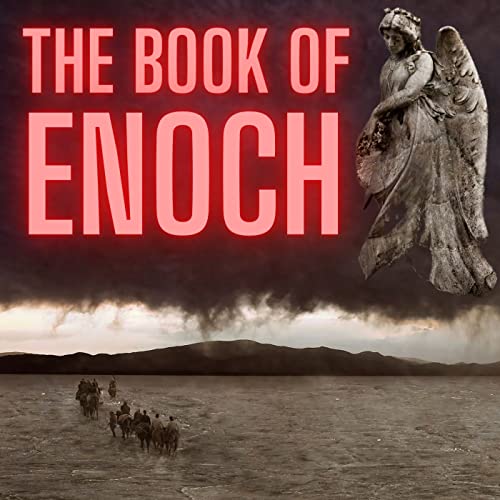The Book of Enoch is a mysterious and intriguing religious text that has captivated scholars and believers for centuries. Its authorship is a topic of much debate, with several theories and arguments put forward over the years. While some believe that it was written by the biblical figure Enoch himself, others propose that it was composed by a later author who used Enoch’s name for credibility. In this article, we will delve into the various theories surrounding the authorship of the Book of Enoch and explore its significance in Biblical and Apocalyptic literature.
Seemore: Why Stay Away from the Book of Enoch
Authorship of the Book of Enoch

The authorship of the Book of Enoch is a complex and contentious issue. There are multiple theories about who wrote the book, each with its own evidence and arguments. Let’s examine them in further detail.
1. Enoch Himself
As the book’s title suggests, the most straightforward theory is that the Book of Enoch was written by Enoch himself. According to the biblical account, Enoch was a righteous man who walked with God and was ultimately taken up to heaven. It is believed that he lived during the antediluvian period, which makes the Book of Enoch one of the oldest texts in existence. However, there are several problems with this theory.
Firstly, the Book of Enoch contains prophecies that were written after Enoch’s death, making it impossible for him to have authored the entire text. Secondly, the language and style of the book are vastly different from the rest of the Hebrew Bible, leading scholars to question its authenticity. Lastly, there is no historical evidence to suggest that Enoch was a writer or had any literary abilities.
2. A Later Author
A more plausible theory is that the Book of Enoch was written by a later author who used Enoch’s name to give the book authority. This author could have been a prophet or a priest from the Second Temple period, seeking to spread their own beliefs and teachings. There are several pieces of evidence that support this theory.
One such piece of evidence is the fact that the Book of Enoch contains ideas and concepts that are not found in the rest of the Hebrew Bible, indicating that it was written during a later time period. Additionally, the book’s language and style are more closely related to other apocalyptic literature from the Second Temple period, suggesting that it was composed during this time.
The Enochian Tradition

The figure of Enoch has a significant role in various religious and cultural traditions. In the Hebrew Bible, he is described as a righteous man and the great-grandfather of Noah. However, in the Book of Enoch, his character takes on a more complex and mystical nature. This has led scholars to believe that the Book of Enoch was written within the context of the Enochian tradition, which includes a collection of texts that reference Enoch as a central figure.
The Enochian tradition also includes the “Book of Giants,” another ancient text that references Enoch and the sons of God. This further supports the theory that the Book of Enoch was written by a later author who drew inspiration from existing Enochian texts.
Enoch in Biblical and Apocalyptic Literature
Enoch is mentioned briefly in the Old Testament as the seventh generation from Adam. However, apart from this mention, there is little information about him in the Hebrew Bible. In contrast, his character plays a much more prominent role in various apocalyptic works, such as the Book of Jubilees and the Book of Giants.
Some scholars argue that the Book of Enoch should be included in the canon of the Hebrew Bible due to its close connections with other apocalyptic literature and its influence on early Christian thought. However, others maintain that its exclusion is due to the book’s non-canonical status and its inclusion of ideas that are not in line with mainstream Jewish beliefs.
The Historical Context of the Book of Enoch
The historical context in which the Book of Enoch was written is crucial in understanding its authorship. The text’s apocalyptic themes and references to angels, fallen angels, and giants suggest that it was composed during a time of great turmoil and religious upheaval.
Some scholars propose that the book was written during the Hellenistic or Greco-Roman period, as evidenced by its use of Greek terms and influence from Greek mythology. This theory is further supported by the fact that the Book of Enoch was not included in the canon of the Hebrew Bible, which was solidified during this period.
The Language and Style of the Book of Enoch
One of the most significant arguments against Enoch’s authorship is the language and style of the Book of Enoch. Unlike other biblical texts, which were written in classical Hebrew, the Book of Enoch is written in Aramaic, an ancient Semitic language. This alone suggests that it was written during a later time period than Enoch himself.
Moreover, the book’s style and structure are more closely related to other apocalyptic literature from the Second Temple period, such as the Book of Daniel. This indicates that the author was familiar with this genre and drew inspiration from it when writing the Book of Enoch.
The Structure and Content of the Book of Enoch
The Book of Enoch is a complex and enigmatic text, consisting of five distinct parts or books. These books contain various visions and revelations attributed to Enoch, which outline the history of creation, the fall of angels, and the coming judgment. Additionally, the book includes detailed descriptions of a heavenly realm, including its inhabitants and their activities.
The content of the Book of Enoch has sparked much debate among scholars. Some argue that it was influenced by other apocalyptic texts, such as the Book of Daniel and the Book of Isaiah. Others suggest that it was written in response to contemporary events and religious beliefs of the time.
The Book of Enoch and Rabbinic Literature
While the Book of Enoch was not included in the Hebrew Bible’s canon, it still had a significant influence on rabbinic literature. Many passages from the Talmud and Midrashim make reference to Enoch and his visions. However, these sources often interpret Enoch’s writings in a more allegorical manner, rather than taking them literally.
Some scholars propose that this shift in interpretation occurred due to the book’s non-canonical status and its association with heterodox beliefs. Nonetheless, the Book of Enoch remained a prominent source of inspiration for Jewish mysticism and esoteric teachings.
The Book of Enoch and Christian Thought
The Book of Enoch holds great significance in early Christian thought and belief. It is referenced in the New Testament by Jude and Peter, and several early Church Fathers, including Tertullian and Origen, considered it to be divinely inspired. Moreover, many early Christians believed that Enoch’s prophecies referred to Jesus Christ and the coming of the Messiah.
The Book of Enoch also had a profound impact on Gnostic Christianity, which incorporated elements of Jewish and Greek mythology into their beliefs. This further highlights the book’s influence on early Christian thought and its role in shaping religious beliefs and practices.
The Book of Enoch and Modern Scholarship
Since its discovery in the late 18th century, the Book of Enoch has been subject to much scholarly research and debate. Its exclusion from the canon of the Hebrew Bible and its enigmatic content have led many to question its authorship and authenticity.
While some scholars propose that the book was written by a single author, others argue that it was composed over a period of time by different authors. This theory is supported by the book’s structure and content, which show signs of multiple redactions.
The Book of Enoch and the Dead Sea Scrolls
The discovery of the Dead Sea Scrolls in 1947 shed new light on the Book of Enoch and its significance to ancient Judaism. These scrolls contained fragments of the Book of Enoch, along with other apocryphal texts, suggesting that they were highly regarded by the community at Qumran.
Moreover, the Book of Enoch found among the Dead Sea Scrolls contains additional chapters not found in other versions, further complicating our understanding of its authorship and origins.
Conclusion
In conclusion, the authorship of the Book of Enoch remains a topic of much debate and speculation. While some theories suggest that it was written by the biblical figure Enoch himself, evidence suggests that it was composed by a later author or group of authors during the Second Temple period. Regardless of its author, the Book of Enoch holds great significance in both ancient and modern religious thought and continues to captivate readers with its enigmatic content.
